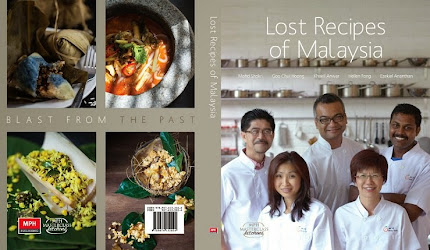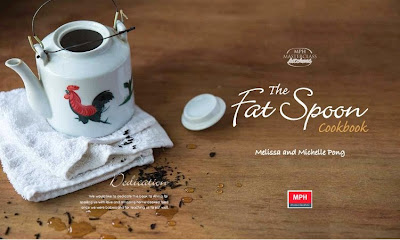What's in this collection of recipes under the MPH Masterclass Kitchens series includes some "vintage" dishes that aren't lost yet, but are in danger of going extinct. Rendang tok, for instance, takes hours to prepare and while a favourite of many, I doubt just as many would aspire to make it themselves.
Nevertheless, I was delighted with its inclusion. Now, if the water supply would return to normal....
Much has been said of Malaysia's culinary diversity. But beyond the more popular char kway teow, roti canai and nasi lemak are dishes that our forefathers used to make and enjoy, at an era when life was less hectic, people were much closer to nature and made the most of what they grew or reared in their backyards.
In the rush towards modernity, memories of simple schoolyard snacks such as asam boi popsicles and skewered sengkuang slices, as well as rendang tok and the less-heard-of banana-stem paratal, are slowly but surely fading away.
Fearing the loss of these traditional flavours, Hellen Fong marshalled several chefs from her cooking school, At 19 Culinary Studio, in an effort to rescue them from obscurity.
Tapping into their own memories and family recipe archives, Fong and her team: Mohd Shokri Abdul Ghani, Goo Chui Hoong (who published her own MPH Masterclass Kitchens cookbook, Khairil Anwar Ahmad and Ezekiel Ananthan) have come up with this collection of Lost Malaysian Recipes, a culinary time capsule that's sure to take us back to a Malaysia some of us still remember.
"By 'lost', we don’t mean recipes that are no longer available," Hellen Fong explains. "Instead, this cookbook aims to retrace and recreate some of the vintage Malaysian recipes that may have been changed along the way to cater to the modern palate and lifestyle."
After a brief introduction to the history of Malaysian food and the myriad of ingredients that can be found in a typical Malaysian kitchen, we get to know each of the chefs in this book and the recipes they share with us.
"It took us a while to track down these recipes, ensuring to the best of our abilities that they are indeed authentic," says Fong. "And now, we encapsulate them into this book to keep them safe from being lost and forgotten – a treasure to leave a lasting impression on Malaysian cuisine."
Though only a small selection of what this country's long and rich culinary history has to offer, this book will have you hungry for a taste of that history and curious about what these chefs have not dug up.
Lost Recipes of Malaysia
Hellen Fong, et al.MPH Group Publishing
194 pages
Non-fiction
ISBN: 978-967-415-202-4
Buy from MPHOnline.com
Categories:
New Publications






























